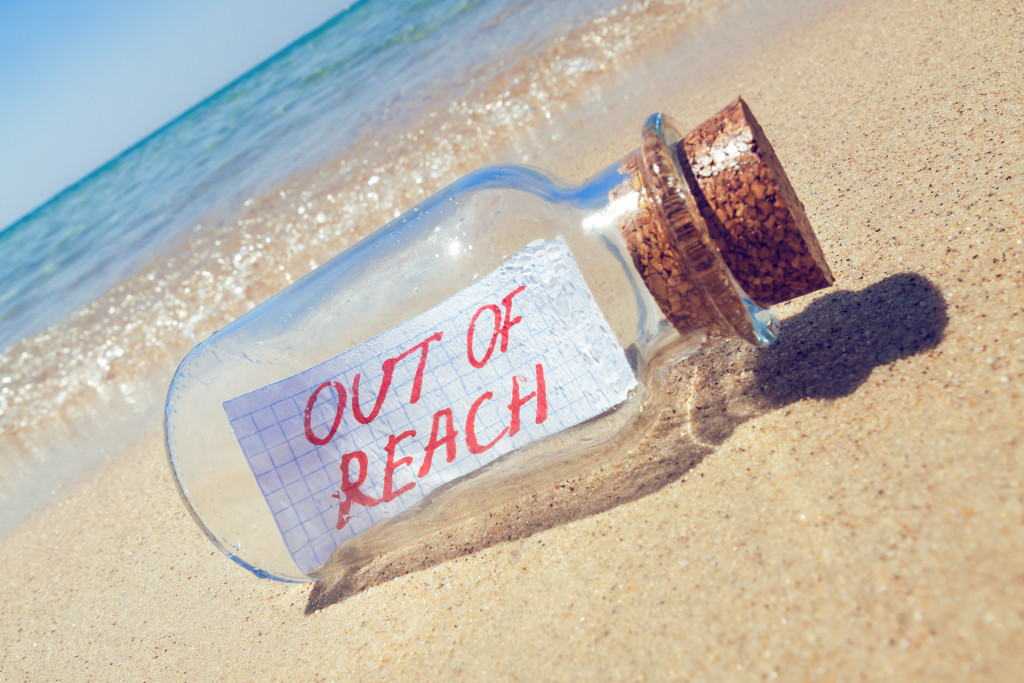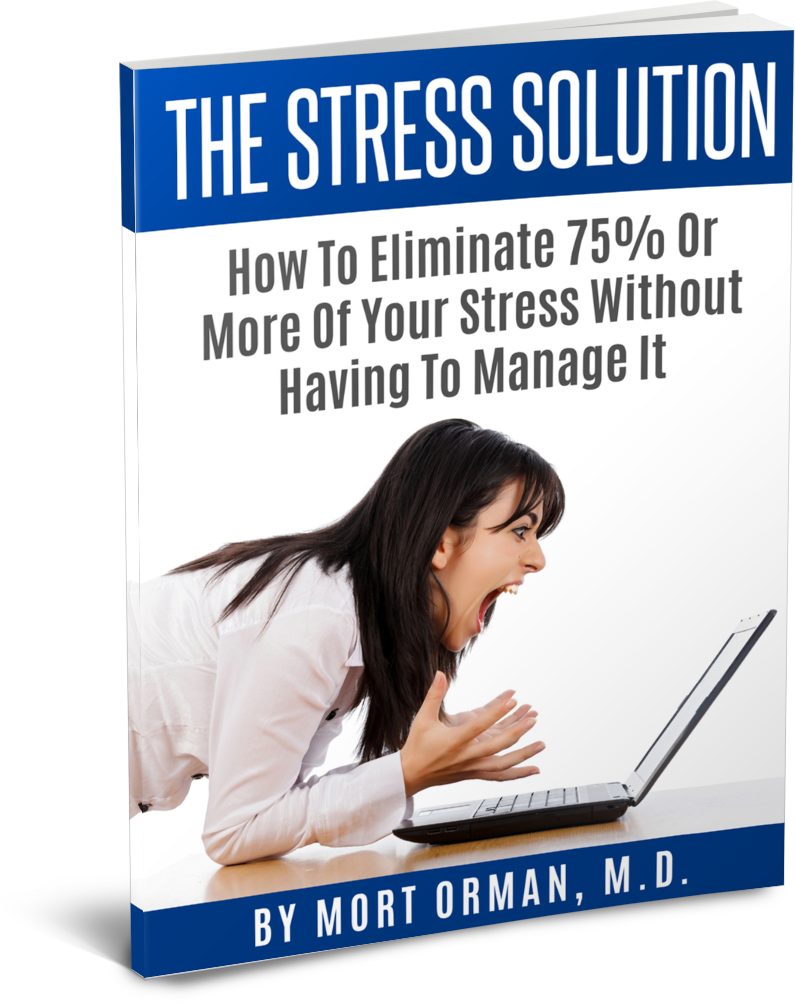My name is Dr. Mort Orman, M.D. and I’m an Internal Medicine physician who’s been helping busy, successful people eliminate stress from their lives for more than 30 years.
In this article, I’m going to share five stress relief tips with you that can help take the edge off any major stress you might be feeling right now.
These may not be the usual quick relief tips you’ve heard about before, such as taking deep breaths, using relaxation techniques, or imagining yourself on a scenic beach in Bora Bora.
But they are tips that will work for you if you take them seriously and give them a try. So let’s dive in.
Tip #1 – Consistent, Restful Sleep

If you’re a successful person, like me, you didn’t get there by being a slacker. You probably work extremely hard and keep very long hours. And you probably cut corners when it comes to your sleep. Perhaps this is because you have deadlines to meet, or maybe you get so excited about something that you just keep working late into the night.
As tempting as this may be, you shouldn’t neglect your sleep.
Getting regular restful sleep is one of the best things you can do to lower your overall stress levels. This is even more crucial, the busier you are.
When your body is deprived of sleep, you feel tired, sluggish, and your mind doesn’t function as well as when you are rested. Thus, your concentration is lowered, you may make more mistakes, and your body will physically be much more susceptible to stress and minor irritations.
I know it can be tempting to think you’ve got such important things to accomplish that you can’t afford the luxury of getting a good night’s rest. But you really should work hard at resisting this common temptation.
NOTE: When I was in private practice and saw patients who were sick and under stress, I would always ask them how many hours of sleep they were getting per night. Invariably they would tell me they were not sleeping well. So one of the first things I would focus on was to help them restore their normal sleep pattern. And when they were successful at doing this, their stress levels went down significantly.
Tip #2: What To Do If Your Mind Starts Racing And Keeps You From Falling Asleep

Since sleep is so important to your overall health and well-being, a common complaint I hear from stressed-out busy people is that they can’t fall asleep because their mind starts racing, just as soon as their head hits the pillow.
Believe me, I know what this is like. There are so many things we may be responsible for in our busy lives, and so many projects, details and concerns that are weighing on us, that it’s hard to stop thinking about them when it’s time to “disconnect” and fall peacefully to sleep at the end of our day.
There is no easy way to magically turn off your thinking. But one thing that often helps is to get out of bed and write down all your thoughts and concerns. Keep a pen and paper at your night table or get out of bed and go to your computer.
Just make sure you get all your pressing thoughts and worries written down somewhere, so they’re not just endlessly floating around in your head.
You might also want to jot down a list of things you need to do the next day, making sure to capture all your high priority items so you won’t have to fear not remembering any of them. Then, get back into bed and feel reassured that you’ve got all your major bases covered.
NOTE: Suppose you feel like you’ve “brain-dumped” all your concerns…and then a new one comes to mind just when you try to relax and fall asleep again? Answer: get out of bed again and write that one down as well. Anything you can do to keep worrisome thoughts from endlessly swimming around in your head when you are trying to get to sleep will probably benefit you.
Tip #3: Gradually Lower Your Intake Of Coffee, Tea, Sodas And Other Sources Of Caffeine

When busy people are feeling stressed, they also begin to feel fatigued. And when this happens, an alarm signal goes off making us think that if we don’t find some external source of “energy” our productivity is likely to suffer.
Typically, we increase our consumption of coffee, tea, and caffeine containing sodas, like Coke, Pepsi and others. Mountain Dew is the high-test version of this strategy. Even worse are quick-boost energy drinks, which are typically loaded with caffeine or other stimulants.
Caffeine is a stimulant which, in addition to giving you an energy boost, can also make you irritable, on-edge, and slightly anxious. It can cause your heart rate and blood pressure to rise, and it can also make it more difficult for you to get to sleep at night…especially if you consume any of these products within several hours of bedtime.
So if you are under stress and are hitting the caffeine pretty hard, you may want to reconsider this coping strategy. Try weaning yourself off caffeine products and switch to caffeine-free alternatives instead.
NOTE: Caffeine can be physically addicting, just like nicotine in cigarettes or alcohol, both of which are often used for quick stress relief. Physical addiction is more likely if you’ve been ingesting large quantities of caffeine over months or even years. Thus, if you try to stop all at once…you could feel even more stressed from withdrawal symptoms. Thus, most physicians and other health professionals recommend slowing tapering down your use of caffeine products, over a period of several weeks, rather than trying to eliminate them all at once.
Tip#4: Carve Out Time To “Decompress” For At Least 30 Minutes Each Day

This tip may be anathema to most busy, successful, hard-driving, Type-A individuals, and you’ve probably heard this advice a million times before, but it really can help to have some “decompression time” every single day you are “working.”
By “decompression time” I mean at least 30 minutes of a mental “time out” from the hard-driving schedule you are accustomed to following non-stop.
I don’t care how busy you are, or how important your job may be, you can always find 30 minutes every day to carve out for yourself …if you really put your mind to it. And if you are successful person already, you have what it takes to make this happen.
Use this time to disengage from all your work-related concerns. Do something simple that you might thoroughly enjoy, like taking a slow walk and paying attention to the beauty of nature, or reading a novel, or listening to music you enjoy. Or you can use this time to do some yoga, meditation or any other relaxing activity that doesn’t involve thinking about work or any problems you might be facing.
If you make this a habit, and protect this carved out time period from interruptions, you will likely see benefits that far exceed your expectations.
NOTE: Daily discipline is key here. You will probably have to fight hard to establish and then maintain this healthy habit. First, you will have to fight against your own temptations to get back to work and stop “goofing off.” Then, you will have to fight off other people who may not see this use of time as productive and therefore will feel justified in encroaching upon it. But hey…you’re a successful human being, so you can make this happen if you truly want to.
This final tip is also one you may have heard before, but if you haven’t personally experienced the benefits of getting weekly, relaxing massages, you really should try this out.
This may require you to take an hour out of your schedule every week, or possibly more to account for travel, but you can usually schedule this outside of business hours. And if you do follow this advice, I think you will benefit from it.
NOTE: Of course you will need to find a good massage therapist, and there are many around if you know where to look for them. You can ask friends for referrals or simply Google “massage therapists [city]” to find them. There may also be a school for massage therapists in your area or an association that can help you with referrals. Some massage therapists may even be equipped to be mobile and come to your home. If the first one you try out doesn’t fit well, and doesn’t make your body feel refreshed and relaxed, try out others until you discover a good match. Oh…and by the way…when you are lying on the table, getting your weekly relaxing massage, don’t screw it up by thinking about work the whole time. Use this as another great opportunity to fully “decompress” and tune out from all of life’s worries and responsibilities, both physically and mentally.
Summary
To recap, in this article we briefly covered these five stress reducing tips:
1. Get Consistent Restful Sleep – don’t underestimate how important this is, and resist the temptation to cut corners here.
2. Get Out Of Bed And Write Things Down – if your mind starts racing and keeps you from getting to sleep, get out of bed and write down all your worries, concerns and to-do’s for the following day.
3. Cut Down On Caffeine – relying too heavily on caffeine for extra energy can backfire on you in many ways.
4. Decompress Daily – carve out at least 30 minutes each day to mentally “decompress” and thoroughly enjoy “mindless” activities.
5. Get A Massage – establish a new habit of getting a weekly, relaxing massage.
Hope you got value from these five tips, but here’s one more thing…
Next Step
While these are five excellent tips to help you start reducing your stress, quick-fix approaches will only go so far.
This is because they are mostly superficial, Band-Aid approaches.
The best way for busy people like you to permanently reduce your stress is to learn how to address key stress-producing issues (many of which are hidden from your view) that are causing your stress to occur in the first place.
Despite what you may think, this is not very difficult to do.
If you are interested in going way beyond these five tips, and you want to learn how to reduce 50% or more of your stress both at home and at work (without having to manage it) just sign up for my email list below and I’ll show you how.
Click here to join our email list to get additional stress relief advice from Dr. Orman



